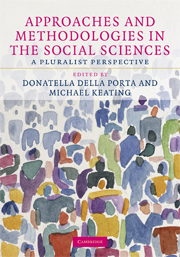Book contents
- Frontmatter
- Contents
- List of figures
- List of tables
- Contributors
- Preface
- 1 Introduction
- Part I Epistemology and philosophy of the social sciences
- 2 How many approaches in the social sciences? An epistemological introduction
- 3 Normative political theory and empirical research
- 4 Causal explanation
- 5 Constructivism: what it is (not) and how it matters
- 6 Culture and social science
- 7 Historical institutionalism
- 8 Game theory
- 9 Rationality and recognition
- Part II Research design
- References
- Glossary
- Index
9 - Rationality and recognition
Published online by Cambridge University Press: 05 June 2012
- Frontmatter
- Contents
- List of figures
- List of tables
- Contributors
- Preface
- 1 Introduction
- Part I Epistemology and philosophy of the social sciences
- 2 How many approaches in the social sciences? An epistemological introduction
- 3 Normative political theory and empirical research
- 4 Causal explanation
- 5 Constructivism: what it is (not) and how it matters
- 6 Culture and social science
- 7 Historical institutionalism
- 8 Game theory
- 9 Rationality and recognition
- Part II Research design
- References
- Glossary
- Index
Summary
Shylock: You'll ask me, why I rather chose to have
A weight of carrion flesh than to receive
Three thousand ducats: I'll not answer that:
But, say, it is my humour: is it answered?
(William Shakespeare, The Merchant of Venice)Introduction
A central problem in the social sciences concerns the relationship between the individual and larger social aggregates (see della Porta and Keating, ch. 1). One influential approach is based on methodological individualism, allied with the assumption that individuals are motivated by a rational assessment of their own self-interest; larger social processes are merely the sum of individual actions. Some of the difficulties of this approach are addressed by Christine Chwaszcza (ch. 8), who shows how even self-regarding individuals must consider the actions of other people.
A different approach is the one that could be considered the classical sociological approach (from Durkheim to Lazarfeld and Merton), pre-dating the introduction of methodological individualism. What follows is a redescription of such an approach taking into consideration the necessity of answering certain positions advanced by rational choice theory.
In discussing some important contributions in classical sociology this chapter will advance the general position that sociality is based not on the social action of an actor maximising utility (or self-interest) but on a relation between actors attributing to each other a social name, or social identity.
- Type
- Chapter
- Information
- Approaches and Methodologies in the Social SciencesA Pluralist Perspective, pp. 162 - 174Publisher: Cambridge University PressPrint publication year: 2008
- 19
- Cited by

